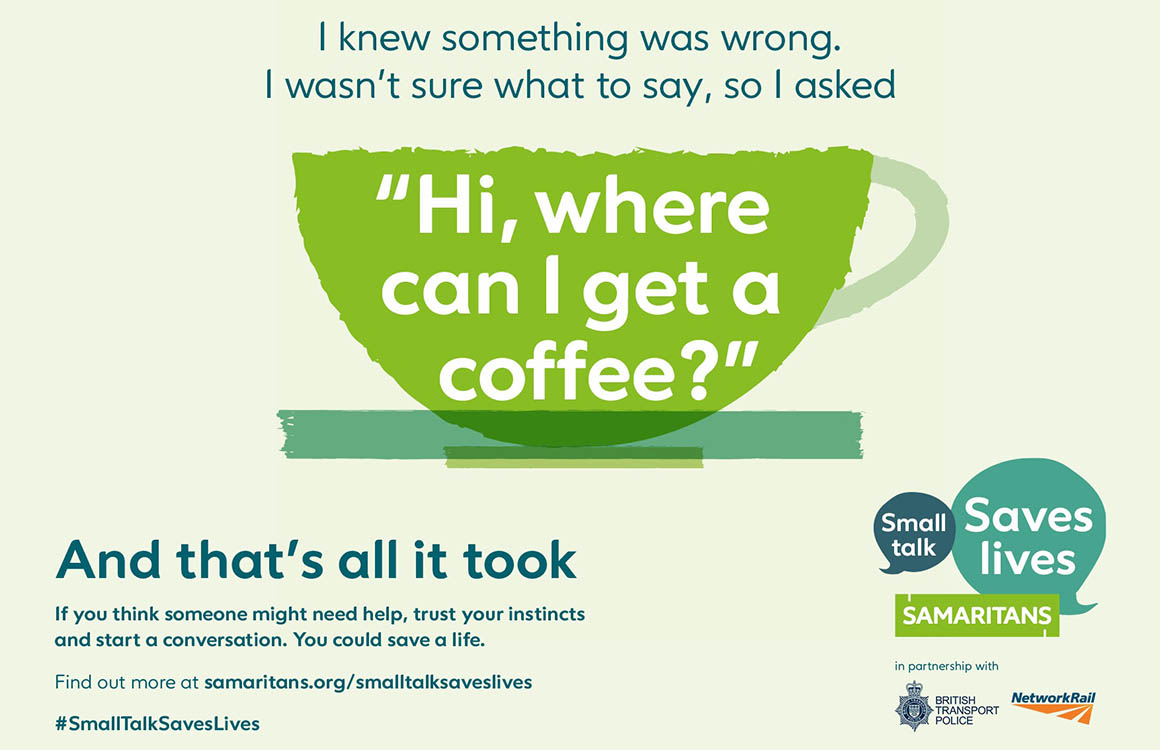MDX research supports campaign demonstrating how small talks can save lives
3 August 2021
/28x0:1132x750/prod01/channel_3/media/middlesex-university/news-section-images/2021/Small-talk,-saves-lives.jpg)
Middlesex research backs the Samaritans relaunch of the Small Talk Saves Lives campaign as the nations readjusts to life without restrictions
Initially launched in 2017, Small Talk Saves Lives was developed after research showed passengers have a key role to play in suicide prevention.
The latest phase of the Samaritans’ Small Talk Saves Lives campaign has the backing from leading suicide prevention expert and psychologist, MDX academic, Associate Professor Lisa Marzano. Further new research from Marzano has confirmed that when asked, people with experience of suicidal thoughts said that verbal interventions, including small talk, providing reassurance and listening, are the most helpful things a person can do to respond to someone in a crisis.
“I am pleased to support Samaritans’ latest phase of Small Talk Saves Lives. This important campaign remains a testament to the fact that we can all play a crucial role in preventing suicide and help someone who may be in need by looking out for one another. It could save lives.” Associate Professor Lisa Marzano, Middlesex University
The UK public may be internationally renowned for being more reserved but a new survey by Samaritans shows how much we rely on small talk, even with the limiting social restrictions of the pandemic. A YouGov survey found that over three quarters of UK adults (78%) used small talk during the pandemic, whilst almost one in five of those surveyed say they are more likely to want to make small talk with a stranger face to face once restrictions are lifted (19%).
Just over half of those who are more likely to want to make small talk said it was because they now recognise the importance of human connection (51%) and with 39% of respondents saying they also appreciate the sense of community the pandemic brought out in people. During pandemic restrictions, people said they made small talk with neighbours they hadn’t spoken to before and with strangers at the supermarket (both 37%).
Despite the unprecedented events of the last year, the weather still remains the go-to subject for striking up conversation, chosen by 71% of people, compared to coronavirus in second place with 45%.
The findings come as Samaritans relaunches Small Talk Saves Lives, in partnership with Network Rail, British Transport Police and the wider rail industry, to empower the public to act to prevent suicide on the railways and other settings.
As the nation begins to readjust to life with easing restrictions, the campaign reminds the public they already have the skills to start a conversation with someone who needs help, giving them the confidence to act. If something doesn’t feel right, a little small talk and a simple question, such as “Hello, what’s the time?” can be all it takes to interrupt someone’s suicidal thoughts and help start them on the journey to recovery. It could save a life.
The survey also highlighted the benefits small talk can have, with over half of respondents saying it can make people feel less lonely (57%) and boost their own mental health and wellbeing (45%), as well as showing others that people care and want to help them (28%).
Network Rail’s Dom Mottram, age 32, knows the importance of small talk after he experienced suicidal thoughts aged 19 and was considering taking his life when a lady approached him and asked him a question – her kindness “snapping him out of harming himself in the moment”. Dom has since helped others in a similar situation both in and out of the rail environment.
Dom said: “I’m thankful for the ripple effect of that lady saving my life – without her stopping and checking if I was okay, I might not be here to now look out for and save others. I’m always on the lookout for anyone who might need help. If I see someone who looks out of place or a bit down, I often just go over and ask if they’re alright and try and bring them to a place of safety. Nine times out of ten the person is absolutely fine – but trusting my instincts and talking to that one person can make such a difference.
“It took me a long time before I spoke to anyone about that moment - but it was a wake-up call and I eventually got help from the university and my family. I’ve had my ups and downs with my mental health after that, but I’ve come a long way since my 19-year-old self and feel I know how to support my mental health now. I’d encourage everyone to talk about how they’re feeling and ask for help. It’s so true that small talk is enough to save someone’s life – just as it did for me and it’s what I always try to do for others.”

Samaritans CEO Julie Bentley said: “We know that the pandemic has had a huge impact on the nation’s mental health and wellbeing and even though restrictions are lifting, people are still struggling. It’s so important we look out for one another now more than ever, because suicide is preventable and it’s everybody’s business.
“How people act when they are struggling to cope is different for everyone – people may seem distant or upset, but suicidal thoughts are often temporary – so if something doesn’t feel right, trust your instincts and try and start a conversation. Whether that’s on a journey home from work as we start to travel more or someone you may pass in the street – any one of us could have an opportunity to save a life. Let’s start a conversation and work together to prevent suicide.”
Find out more about studying Psychology at Middlesex


/0x37:1040x744/prod01/channel_3/media/middlesex-university/news-section-images/Ant-Chrissy-Stephanie_Pride-Awards.jpg)
/8x0:1033x697/prod01/channel_3/media/middlesex-university/news-section-images/2026/Andy-Reed.jpg)
/8x0:1033x697/prod01/channel_3/media/middlesex-university/news-section-images/2025/LSID-LAUNCH-55.jpg)